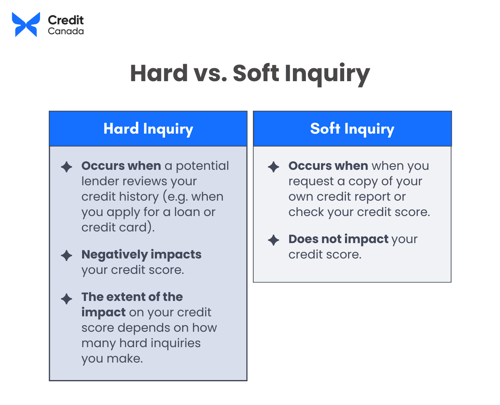
Key Takeaways
- Checking your own credit score does not lower it, and neither does checking your credit report.
- Checking your own credit report is considered a soft inquiry as you are requesting it for personal reference.
- A lender or company making a request to review your credit report as part of a credit application process is considered a hard inquiry. Hard inquiries will impact your credit score.
- It is important to review your credit report regularly to see what’s documented and if the information is correct.
- Using a third-party service, such as Borrowell or Credit Karma, to check your credit score does not lower it.
- If your credit report or score isn’t where you’d like it to be, you have to show your creditors that your financial habits have improved over time by rebuilding a positive credit history.
- Accurate negative information on your credit report cannot magically go away; it’s there until it falls off your credit report, which takes about six years.
- Remember: Improving your credit score is a slow and gradual process.
Your credit score indicates creditworthiness for lenders, meaning it influences the loans you may qualify for, the interest rate you’ll pay, what you can buy on credit, and maybe even where you work and live.
Because of this, monitoring and understanding your credit is one of the most important financial habits you can build. Checking your credit score regularly allows you to make sure the information in your report is correct so you are able to obtain credit when needed, and gain valuable insight into how your behaviours impact your financial well-being.
You may have heard that checking your credit score will lower it, but this isn’t the case. Read on to learn about the difference between a hard and soft credit inquiry and which lowers your score, as well as other common credit misconceptions.
What is a Credit Score?
A credit score is a number between 300 at the low end and 900 at the high end that companies and lenders use to predict how financially reliable and responsible you are. Your credit score can impact what loans you qualify for, what interest rate you pay, what you can buy, where you work, and where you live.
Your credit score is calculated by credit bureaus that convert information on your credit report. Your credit report is essentially a record of your financial behaviours and actions towards your credit products like credit cards, student loans, and bill payments.
You can obtain your credit report for free through Canada’s two credit bureaus, Equifax and TransUnion. You can also obtain your credit score at no cost from Equifax, however, getting your score from TransUnion will require a fee. Each credit bureau maintains their own credit reports and credit scores, but they shouldn't vary too much.
Does Checking Your Credit Score Lower It?
Many Canadians worry that checking their credit score or requesting a copy of their credit report may negatively impact it. This is a myth. Your credit score will not be impacted if you check it yourself, as this is considered a soft inquiry. However, a hard inquiry is a different story.
Hard Inquiries
A hard inquiry occurs when you apply for a loan or a credit card and the potential lender reviews your credit history. These usually take place when you apply for a mortgage, loan or credit card. Any time your credit experiences a hard inquiry, your score will drop a few points. If it’s only one inquiry, then the negative impact to your score will be minimal. However, if suddenly there are a large number of hard inquiries to your report, your score will take a hit and creditors will question why you are applying to so many lenders at once.
Soft Inquiries
In comparison, when you request a copy of your own credit report or check your credit score, this is known as a soft inquiry. Soft inquiries do not affect credit scores and are not visible to potential lenders who may review your credit report. Other types of soft inquiries include companies that send you promotional pre-approved credit card offers, existing lending account reviews by companies with whom you already have an account, and employers doing a background check.

Myths About Credit Scores
Besides checking your credit, it’s important to understand how your score may – or may not – be impacted by other actions. If you’re trying to build your credit score, here are some common misconceptions that may be holding you back:
1. You Can Only Check Your Credit Score for Free Once a Year
You can actually pull your credit report online for free from each of Canada’s two credit bureaus (Equifax and TransUnion) as often as you like. However, the credit bureaus update their information monthly so there’s no point in checking it more frequently than that. You can also check your credit score and history through a third-party service, such as Credit Karma or Borrowell, with updates being offered weekly.
2. Each Person Only has One Credit Score
Canada’s two credit bureaus get their information from different sources. For example, some creditors report to one bureau and not the other. This means your credit reports from each may vary slightly. In addition, Equifax and TransUnion use their own algorithms to calculate a credit score, so you may have a different one at each.
3. Couples Share Credit Reports
Credit scores are linked to personal information, including your Social Insurance Number, so your credit history remains separate from that of your partner, even after getting married. However, any joint accounts will show up on both partners’ credit reports.
4. Closing a Credit Card Account Won’t Affect Your Credit Score
Closing a credit card affects credit utilization – the percent of total available credit that you’re currently using. Credit utilization is one of the factors used to calculate your credit score. When you close a credit card, the available credit drops, which means your percent of available credit used increases. If the increase is high enough, it will hurt your credit score because the closed card's unused credit limit no longer provides balance in the relationship between your other credit factors. Of course, the variation in the credit utilization ratio is contingent on whether or not there are any balances being carried on the remaining credit cards.
How to Monitor and Improve Your Credit Score
If your credit report or score isn’t where you’d like it to be, the only way you can go about “fixing” it is by rebuilding it with a positive credit history.
Accurate negative information on your credit report cannot magically go away; it’s there until it falls off your credit report, which takes about six years. In the meantime, you have to show your creditors that your financial habits have improved, which takes time. Here’s what you can do to get the ball rolling:
1. Review Your Credit Report
It is important to review your credit report at least once a year from either credit bureaus, a third-party service, such as Credit Karma or Borrowell, or your bank’s website or mobile app. Look over the report to see what’s documented and if the information is correct. For no charge, you can remove incorrect information by filing a dispute directly with the credit bureau.
2. Beware of Credit Repair Services
Credit repair companies say they will repair your credit by removing negative information from your credit report, thus boosting your credit score—for a costly, upfront fee. These companies often take advantage of the fact that many Canadians don’t know you can’t remove accurate information from your credit report—even if it’s bad! You should be skeptical if any company says they can do so.
3. Work to Pay Off Your Debts
Work towards paying down your current debts by putting the most money towards your unsecured debts first, such as payday loans, credit cards or personal loans, as these tend to have the highest interest rates.
4. Make at Least the Minimum Payments by the Due Dates
Late payments have a negative impact on your credit score, so be sure to at least pay your monthly minimum payments for each debt you currently have. A history of consistently paying down debts can be a good starting point for building your credit.
5. Create and Follow a Budget
It is crucial to stay on track with your finances to avoid missed payments, as those can lead to a decreased credit score. There are many online budgeting tools and apps that can help you establish a realistic spending plan, including Credit Canada’s free Budget Planner + Expense Tracker. Remember, the key to a successful budget is sticking to it!
6. Get a Secured Credit Card
A secured credit card can help you build your credit score without paying interest. How it works is you put down an initial deposit that determines the amount of credit you’ll have. The bank or lender then keeps this money in case you fail to make your payment. But keep in mind credit shouldn’t be used to replace money you don’t have, so be responsible with it.
7. Contact Credit Canada
If you need help with rebuilding your credit? Call Credit Canada for personalized advice on improving your credit score. A certified credit counsellor can provide advice tailored to your specific situation—and their counselling services are completely free. They can even review your credit report and advise you on how to best address your debts and increase your credit score.

Frequently Asked Questions
Have a Question? We are here to help.
Why does your credit score go down when you check it?
Does checking your credit report lower it?
Does checking your credit score on Credit Karma or Borrowell lower it?
Will Debt Consolidation hurt my credit score?
Most people entering a DCP already have a low credit score. While a DCP could lower your credit score at first, in the long run, if you keep up with the program and make your monthly payments on time as agreed, your credit score will eventually improve.








